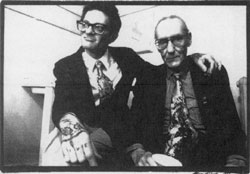With a mad genius like Theodore Roethke, it’s easy to separate the poet and the legend. The stories of Blue Moon drunks and maniatossing $100 bills in the street, walking out of his classroom midlecture to parade on the high ledgewere distinct from the poems under control that made him great.
But Steven Jesse Bernstein’s public acts of madness were intrinsic to his art.
It was Bernstein’s life onstage that made his name, his influence that makes him great. Only 13 inches taller than the dwarf in The Station Agent, Bernstein was not a big man; yet Grant Alden, Bernstein’s editor at the late Seattle music paper The Rocket, says “people were scared of him. He had an aura that made you think he was pro wrestler-size. Those tattoos and that wonderful growling voice created a space for himself.”
As Seattle scenesters slouched from the sensible suburbs toward the self-invented Oz of grunge, their art and music were centrally inspired by Bernstein, his louche visions, dark humor, and sky-high ambition. “I mean, the man read a poem with a mouse in his mouth,” says Alden. Charles Cross, another former Rocket editor (and current SW contributor) was there that night, too: “The mouse’s tail kept moving around his mouth. This was before Karen Finley did her yam jam. He was the real deal, pushing the edge. He pulled a switchblade and said, ‘If anybody laughs or walks out, I’ll cut my dick off!’ and put a finger in his anus and wiggled it back and forth. I didn’t want blood or poop hitting me, so I moved back from the front row. A vague smell of fecal matter hung over the room.” (Maybe it’s just as well Cross didn’t hire Bernstein when he applied to be The Rocket‘s receptionist.)
Bernstein was always a disciplined writer. “As wild and chaotic as his life was, as poor as he wason public assistance since he was 14he never missed a deadline,” says Alden. Yet Bernstein’s importance is not captured in those intermittently glittering, mostly wispy, drifty pieces in his two writing collections, More Noise Please and I Am Secretly an Important Man. The Chronicle Books editor who refused to publish Bernstein was correct in finding him derivative of Burroughs. With his astounding lower-depths life story, Bernstein writes better when emulating the early, more earthbound memoir style of Burroughs’ Junky than the later, weirder work he aped badly, not possessing Burroughs’ education and literary chops. Bernstein was like a Picasso wanna-be who never mastered draftsmanship, went straight to post-cubism, and produced more scribbles than felicities.
In fact, he was publicly an important man; facing a typewriter, without an audience, he seldom found a structure to channel his surging imagination. Compare Bernstein’s story about necrophilia with Nixon and Paul Krassner’s story “The Parts Left Out of the Kennedy Book,” in which Jackie catches LBJ in flagrante delicto with a dead JFK: Krassner finds structure by parodying Jackie’s actual book and developing the paranoid fantasy. Bernstein’s similar fantasy is striking but desultory, an inspired notion inadequately shaped by art.
Yet Bernstein and Burroughs were united by “their love of words, writing, intrigue, conspiracy, and all things medical,” muses Ashleigh Talbot, a ’90s Seattle illustrator who collaborated with both. “And, of course, drugs.” Bernstein hated pot, wallowing in pills and booze; Burroughs was a booze-hating pothead. The night of their historic and influential 1988 Moore Theater show, “they took heroin together. I felt it was one of Jesse’s absolute worst performances,” Talbot says.
But Burroughs’ big addiction was behind him, and he was a past master of the fame game. “Anytime success came within Jesse’s realm, he would sabotage it and subconsciously kill it off,” says Talbot. “With the Prison tape coming out, I think the thought of looming fame was just a bit too much for him.” “It sort of trapped him,” says Cross. “His work was about darkness, he was celebrated for it.”
Though Bernstein was more Beat than punk, being lionized by Seattle punk helped kill him. “People wanted to shoot up with Jesse because he was the old junkie,” says Alden. He was, says Talbot, “not just falling off the wagon, but diving head first.” Bernstein regularly called her with a shotgun in his lap; his last message said he had found “a way out of this little scheme.” She warned Burroughs not to come out for Bernstein’s funeral because it would be a circus. “That was literally when the whole Seattle grunge thing hit. It all seemed to begin with a suicide and it all ended with a suicide,” says Talbot. “Like bookends from hell.”








